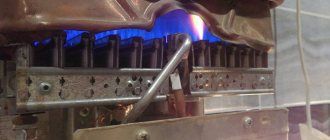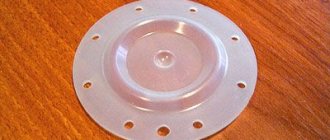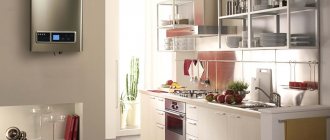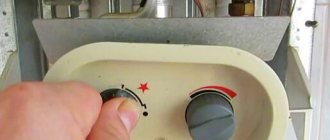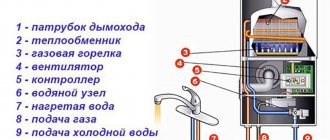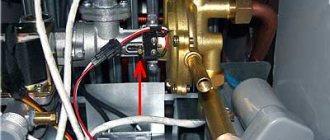Every year, installing an individual source of hot water supply in private houses and apartments is becoming more and more important. The era of centralized hot water supply is gradually becoming a thing of the past, because sometimes it may be more profitable to have your own water heater. This allows you to control utility costs and save money at your own discretion. The only question is: what equipment to choose for heating water? The purpose of the article is to give a detailed answer to this question, to determine which is better - a gas water heater or a boiler, revealing all the pros and cons of various water heating units.
Types of household appliances for DHW needs
At the moment, there are 2 types of water heaters that differ in operating principles: instantaneous and storage. Both use two energy sources: natural gas and electricity. Let's collect them all in one list:
- geysers for water;
- electric storage water heaters (boilers);
- gas storage heaters;
- electrical flow installations.
The first 2 types of water heating devices are the most popular; they constantly compete with each other, despite the difference in the energy carriers used. Geysers are devices that directly heat running water in a heat exchanger with a burner flame. Hot water is supplied almost instantly, you just need to open the tap.
Electric boilers work differently: a tank filled with cold water is gradually heated by built-in heating elements. It makes sense to turn on hot water when the container has heated up to at least a temperature of 40 ºС, which will take 2-3 hours. If the temperature has reached the set temperature, but there is no water supply, the device maintains it at a certain level, turning the heating elements on and off.
Less commonly, storage gas heaters are used to supply hot water. This product appeared on our market relatively recently and has not yet gained much popularity. A household gas boiler is a kind of hybrid between a gas water heater and an electric boiler. From the latter he took the principle of operation, and from the column - a method of heating water and natural gas as a source of thermal energy.
And finally, instantaneous electric heaters operating on the principle of a gas water heater, only using electricity instead of natural gas. For this reason they got their name - electric speakers.
Despite the fact that they appeared on the market a long time ago, to this day they are truly exotic, as they are very rarely found in private homes. The reason lies in the device’s electrical power being too high; not every home has such power. Therefore, we can consider these heaters only for informational purposes. Now, to make a comparison, we will analyze each type of equipment separately.
Indirect water heaters
By the way, it is possible to significantly reduce energy consumption by using new types of equipment.
Indirect storage water heater NIBE MEGA WE-150.81
So, which is better, an indirect type boiler or a column:
- An indirect type boiler allows you to reduce energy consumption during the heating season. Its design contains an internal heat exchanger through which the coolant from the heating system circulates. It is with its help that water heating is ensured.
- When the heating is turned off, the boiler operates as a standard device. By the way, there are models with built-in heating elements and a gas burner.
Devices of this type can significantly reduce the cost of providing hot water supply, however, such boilers are quite expensive.
We also recommend watching:
- Chimney design for a geyser
- How to choose the best water heater for a bath?
- Choosing the best circulation pump for heating systems
- Types and tips for choosing infrared wall heaters
Gas water heaters: pros and cons
The biggest and main advantage of units of this type is the ability to provide the house with hot water for an unlimited time. The burner of the device begins to heat the water almost immediately after opening the tap and will do this until the valve closes. This feature of geysers makes them the undoubted leader among all units in terms of comfort.
The only condition: the thermal power of the burner must be enough for all consumers. Modern turbocharged units are equipped with electronic combustion intensity control systems, as a result of which changes in water pressure have virtually no effect on its final temperature. But if the thermal power of the gas water heater is initially selected incorrectly, then at high flow rates barely warm water will flow from all the mixers.
An important advantage of gas instantaneous heaters is their small dimensions, allowing the device to be squeezed into the smallest kitchen. This is why speakers are so popular among residents of small apartments. In addition, the product is quite reliable (if you do not take into account Chinese products) and repairable. Due to the fact that water supply networks in the post-Soviet space leave much to be desired, the gas water heater periodically requires maintenance and cleaning.
Now about the disadvantages:
- Installation of gas-using equipment is a troublesome task and requires investment. You need to complete the project, get it approved, and then install and connect the heater, which only a licensed organization has the right to do;
- any gas water heater requires a chimney and supply and exhaust ventilation for its operation;
- for stable operation of the device you need a certain pressure of water and gas;
- In terms of efficiency, the column is inferior to a boiler; its efficiency is a maximum of 92% versus 98-99% for electrical appliances.
Another delicate moment. In many cities, the inlet water temperature is very low in winter. A gas flow-through installation, even the most powerful, is not able to heat such water to normal temperature at normal flow rates. That is, when operating at maximum, the column will not produce the promised 10 l/min of hot water, but only 5.
What is their difference
The main difference between these devices is the energy they use. The geyser is powered by gas, which is extracted by connecting to a central gas pipeline. Such a device was invented a long time ago, and during its existence it has evolved from a bulky unit that requires a lot of space into small compact devices.
An electric boiler has the appearance of a capacious tank with a tubular electric heater inside and a water heating control system outside. There are two types of such devices:
- Flow-through is a small device that connects to the water supply pipe and heats the water when the tap is turned on.
- Storage - a tank of different sizes that collects and stores water; heats the water when the tank is turned on.
Unlike a gas water heater, a boiler can work with large volumes of water, which is why various enterprises often choose it.
Advantages and disadvantages of an electric boiler
The storage electric water heater has many advantages, which determines its high popularity:
- simple installation that does not require approvals or the involvement of specialized organizations;
- no chimney or ventilation required;
- independence from pressure in the water supply network and its temperature;
- high efficiency (efficiency up to 99%);
- the ability to simultaneously provide a large flow of hot water;
- The heating elements of a modern boiler do not come into direct contact with water and are not covered with scale.
The two main disadvantages of the unit are the limited volume of water dispensed and the need to wait for the next portion to heat up for several hours (from 1.5 to 5). An incorrectly selected tank capacity will lead to the same consequences as an incorrectly selected power column - cold water will run out of the tap.
The volume of space occupied by the boiler is quite significant compared to a gas flow-through apparatus. And, although there are tanks with a flat configuration, for an ordinary family of 3-4 people you will need a capacity of at least 80 liters, which is a significant disadvantage in an apartment. Because of this, the boiler in small bathrooms is suspended above the bathtub, often hitting the head against it.
Winner selection
Before resolving the dispute - boiler or water heater, let's say a few words about storage gas heaters. They are promising because heating of the entire volume of water in the tank occurs twice as fast as that of its electric “brother.” It is also independent of water pressure and is able to immediately provide high flow rates for domestic hot water. The disadvantages are inherited from the column: the need for permits, the complexity of installation and the need for a chimney and ventilation.
The question - which is better to choose - is not worth it at all when there is no gas supply in the house or an insufficient electricity limit; we consider the situation from other points of view. So, in the “ease of use” category, the gas water heater definitely wins; it allows you to get what you want almost immediately. On the other hand, installation of gas-using equipment will cost a pretty penny. Because installing a boiler will cost less and will be completed much earlier, it wins in the “cost and speed of installation” category.
Which heater will win in the “economical operation” category depends on the location of the user. It is clear that it will be more profitable for Russians to use natural gas, because in the Russian Federation it is much cheaper than electricity and the boiler will always be an outsider. But residents of Ukraine and Belarus have something to think about, for example, a multi-tariff electricity meter. Thanks to him, the storage heater can be in first place.
In the “reliability and service” category, friendship wins. Moreover, with tap water, rich in salts and impurities, which equally successfully attack the magnesium anode of the boiler and the water unit with the heat exchanger of the gas water heater. The anode “lives” from 2 to 5 years, during which time scale grows in the heat exchanger and rubber seals dry out, so the question of which is more economical to maintain remains open.
Comparison factors
Each type of device has its own disadvantages and advantages. All of them directly depend on the conditions in which they are planned to be used.
Although, if you look at this situation from the other side, such equipment becomes the only source of hot water if the house does not have a centralized gas supply.
As you can see, both devices have a sufficient number of advantages and disadvantages, both in operation and in maintenance. The obvious disadvantage of the boiler is its size. An undoubted advantage is that its installation is possible on any surface of the house where there are water pipes and an electrical outlet. A wide range of storage tanks, presented in retail chains, allows you to choose the optimal shape for your home (there are round and flat boilers) and size. The correct shape of the device will ensure optimization of the interior space of the room
It is important to remember that this storage tank should be located at a level that will not complicate the process of cleaning the tank and replacing the magnesium anode.
According to safety requirements, it is recommended to place the gas heater in the kitchen. To use this heater safely, it is necessary to have a good ventilation system.
Another mandatory safety requirement is the presence of a chimney. Using the column requires the presence of an open flame. This leads to oxygen burning. To eliminate negative consequences, regular ventilation of the room is necessary.
